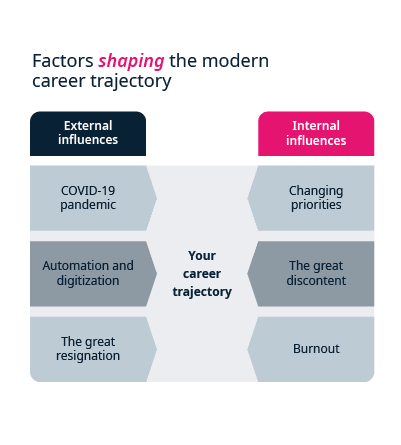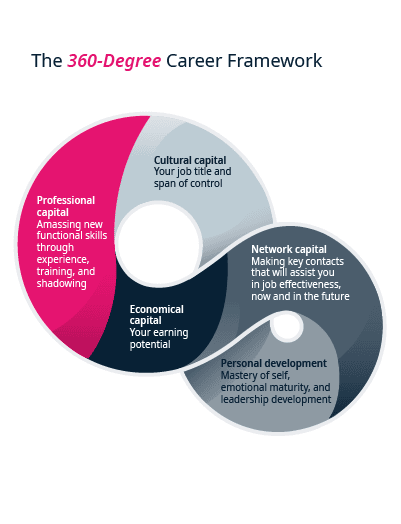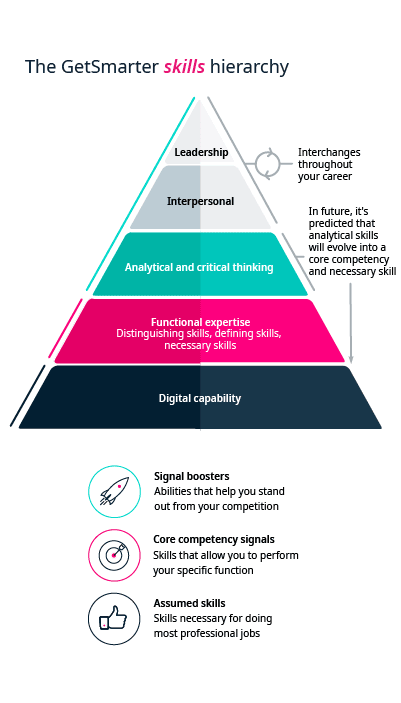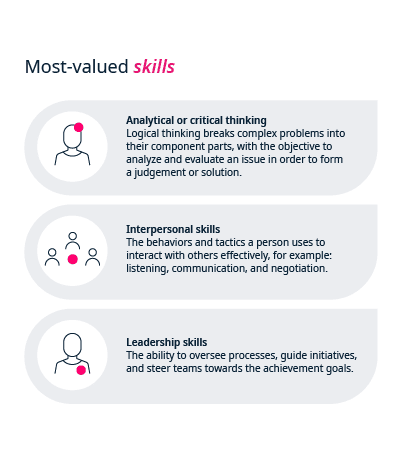Your Career Guide 2022: A 360-Degree Framework
The modern career has been irrevocably changed. COVID-19 has accelerated the effect of disruptive forces such as automation, artificial intelligence (AI), and digital transformation, as well as expedited the move to remote and hybrid work.1 This has led to a fundamental shift in the way people approach their career growth, and transformed the skills required to succeed. The pandemic has also impacted what people want from their careers. The focus is no longer just on money and status, but also on well-being, and personal and professional growth. To address these changes, GetSmarter’s 360-Degree Career Framework outlines the development areas that support a more resilient and fulfilling long-term professional life.
The ‘great resignation’ brought on by the ‘great discontent’
The World Economic Forum found that 70% of workers felt that the restrictions brought on by COVID-19 led to the most stressful period in their career.2 The result has been widespread burnout. In the US, a record-breaking 4.3 million professionals quit their jobs in August 2021, bringing the total resignations to 20 million since April of the same year.3 In a country like South Africa, with an unemployment rate of 34.9%,4 the impact of the ‘great resignation’ is still to be seen. However, it’s foreseeable that the lack of certain skills could see highly skilled South Africans behaving more selectively when choosing where and how they work.
A significant driver of this en masse resignation is the fact that many employees are feeling unengaged or actively disengaged. In the first year of the pandemic, employee engagement dropped globally by two points to 20%.5 Career stagnation is also contributing to the current status quo, with the top reasons for these feelings being lack of clarity about a development path, lack of mentors, and a decrease in one-on-one time with leaders.6

The non-linear career path
In the past, career growth was largely an upward trajectory that led to greater earning, a new job title, and an increase in responsibilities or span of control. However, advancement is no longer linear. In GetSmarter’s 2020 ‘The Future of Work Is Here’ report, the majority of respondents saw their career path as “fluid and changing frequently”. The insights also revealed that more than half of the surveyed professionals say they’re likely to change their jobs in the next 12 months, while 51% claim they may change job function or business area completely. In order to prepare for these career pivots, professionals need to build up transferable skills and a holistic toolkit.
Introduction to the 360-Degree Career Framework
The 360-Degree Career Framework is a modern approach to development that places cultural capital and economic capital within a broader professional growth ecosystem, rather than as an end result. Each growth lever, including professional capital, personal development, and network capital is connected and works in accordance with another. Continuously, each area throughout your professional life creates a more satisfying and fuller career.

Developing your professional capital
As changes to the workplace have accelerated, now more than ever, you need to respond to the future of work by upskilling to remain relevant and competitive in the job market. In fact, 69% of organizations are more focused on skill building than they were pre-COVID-19.7 Megatrends shaping these changes have created a skills gap, but they also offer an opportunity to reinvent your career. The GetSmarter Skills Hierarchy outlines what is required by professionals.

While you may not be planning a career path to last a lifetime, you should still be mapping out a skills development plan. Important functional skills, regardless of industry or occupation, should:8
- Offer value that can’t be replicated by automation and AI
- Meet the requirements of digital transformation
- Adapt to support new roles and ways of working
These transferable skills are the building blocks of a resilient career, supporting whatever professional journey you take. They can be developed through continuous learning, on-the-job experience, and by shadowing peers and more senior professionals within your organization.
Digital capabilities are required to make use of typical office software, such as Zoom and Google Docs. As these tools are constantly evolving, so must your skills and experience.
Focusing on your personal development
As well as a functional skill set, GetSmarter’s Career Guide 2021 has identified critical thinking, leadership, and interpersonal skills as the most important capabilities for a successful career.

These ‘soft’ skills are also transferable to any industry or role. In addition, nurturing them leads to self-mastery, or self-discipline and impulse control, as well as emotional maturity. All of which create resilience, identified as highly sought-after in countries in North America, Europe, and around the world.9
Of the respondents surveyed for GetSmarter’s ‘Leadership Playbook’, 92% feel that leadership is a journey of continual learning, reflection and development, while 84% agreed that leadership will only become more important in the future. The research also found that leadership is less about driving performance and more about developing people.
Building key relationships through network development
Whether you’re taking that next step in your career, looking to change your role, in need of a job, or wanting to improve performance, professional relationships and a strong network can help facilitate both upward and lateral moves. Valuable relationships to seek out and nurture at every stage of your career include:10
- A mentor to teach you
- A sponsor to advocate for you
- A partner in a mutually beneficial peer relationship
- A competitor to drive your performance
- A mentee to help you learn through teaching
Making connections like these will assist you in being effective in your job – both now and in the future.
2U’s Career Engagement Network offers past and current students unlimited access to additional resources that facilitate growth long after your course is complete. These include events and workshops, tools and resources, and a job board.
As well as helping you achieve greater cultural capital, such as a promotion, or increased economic capital, with a bigger paycheck, these three growth levers – professional capital, personal development, and network capital – provide the framework for a resilient and rewarding job life.
Putting the 360-Degree Career Framework into practice
The modern career trajectory is measured in its depth and breadth, rather than a simple upward progression. Internal and external factors have redefined what is important to many professionals, and job satisfaction is multidimensional and requires balance. The 360-Degree Career Framework is a practical approach to building a fulfilling career that’s more resilient to change. It helps you develop a holistic set of tools that can be leveraged at different times throughout your career.
Invest in your professional growth with online courses designed to grow your skill set and power your career
Develop your personal and professional capital with GetSmarter Online Short Courses.
- 1 Lund, S. et al. (Feb, 2021). ‘The future of work after COVID-19’. Retrieved from McKinsey.
- 2 Rooney, K. (Aug, 2021). ‘5 themes shaping the future of work’. Retrieved from World Economic Forum.
- 3 Tharoor, I. (Oct, 2021). ‘The “great resignation” goes global’. Retrieved from The Washington Post.
- 4 (2021). ‘South Africa unemployment rate’. Retrieved from Trading Economics.
- 5 (2021). ‘State of the global workplace’. Retrieved from Gallup.
- 6 (Aug, 2021). ‘The greatest mass resignation in modern times isn’t just about COVID or burnout’. Retrieved from PR Newswire.
- 7 Billing, F. et al. (Apr, 2021). ‘Building workforce skills at scale to thrive during—and after—the COVID-19 crisis’. Retrieved from McKinsey.
- 8 Dondi, M. et al. (Jun, 2021). ‘Defining the skills citizens will need in the future world of work’. Retrieved from McKinsey.
- 9 (2021). ‘2021 workplace learning report’. Retrieved from LinkedIn.
- 10 Fernandez, J. and Velasquez, L. (Jun, 2021). ‘5 relationships you need to build a successful career’. Retrieved from Harvard Business Review.